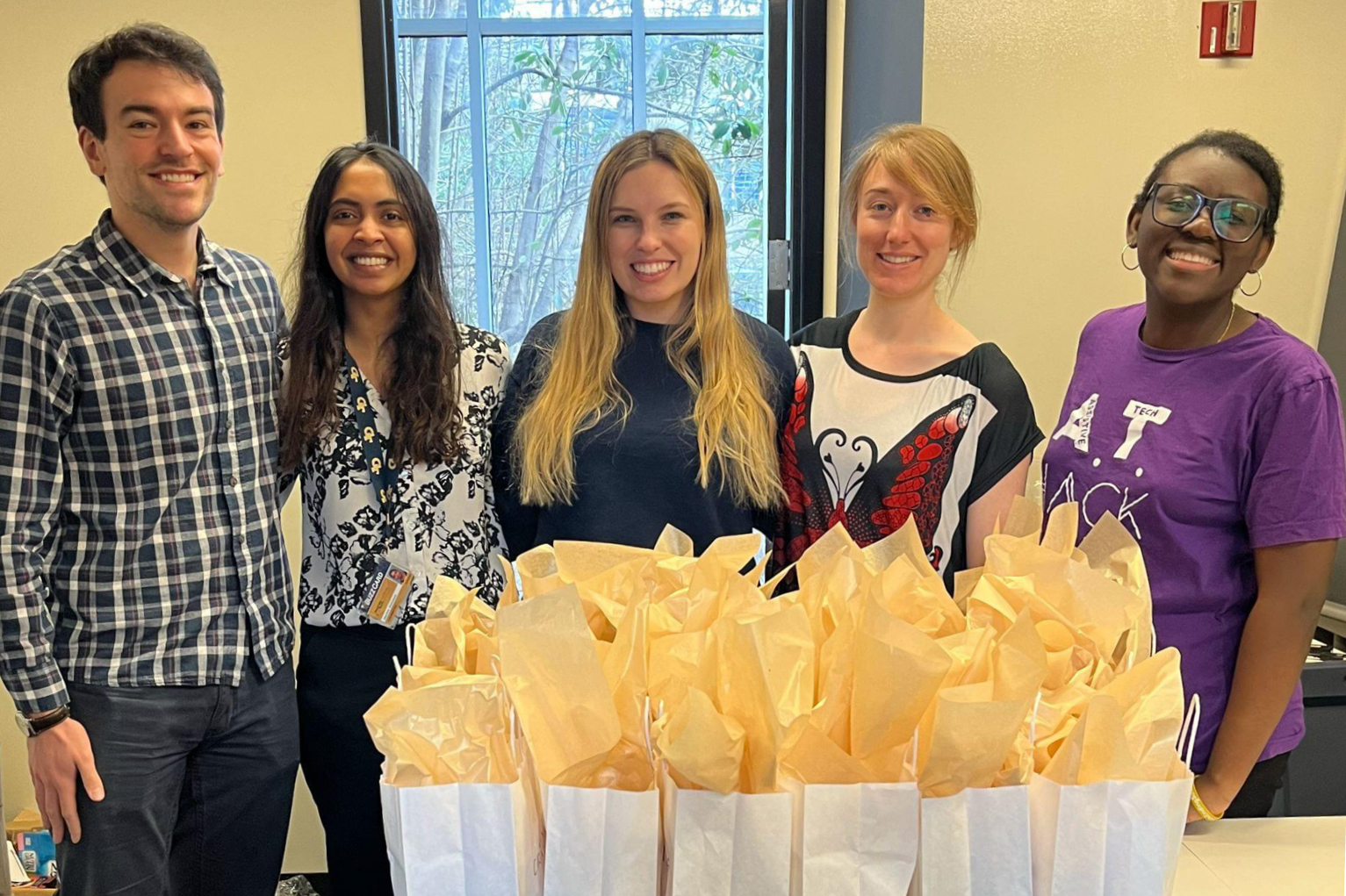
Pictured left to right: Members of the Mechanical Engineering Grad Student Mental Health Committee Derek Nichols, Anusha Krishnan, Anastasia Schauer, Jennifer Molnar, and Bettina Arkhurst.
Improving Mental Health Amongst Woodruff School Graduate Students
The Mechanical Engineering Grad Student Mental Health Committee is dedicated to improving the culture around mental health among graduate students in the Woodruff School.
February 27, 2024
By Chloe Arrington
The pressure of graduate school is no secret, and the George W. Woodruff School of Mechanical Engineering is dedicated to offering support to students through various initiatives including the Mechanical Engineering Grad Student Mental Health Committee (MEMHC).
Originally launched in 2019 as an ad hoc group of students helping students, the committee has since grown to pilot its own initiatives and provide policy feedback to help administrators foster graduate student success in the Woodruff School.
“We believe the work we do is critical for helping graduate students in the department navigate their programs and the impacts of that experience on their mental well-being,” said committee member Bettina Arkhurst.
The committee consists of graduate students who are passionate about mental health, graduate support, and community in the Woodruff School. Each year, members volunteer to work in focus areas they are most passionate about, such as social events, fundraising, community support, and conflict resolution. The 2023-24 committee members include Arkhurst, Akshar Kota, Anusha Krishnan Jennifer Molnar, Madeline Morrell, Derek Nichols, and Christian Viteri.
The group’s initiatives range from the Quals Care Package Initiative, which offers care packages to students taking their qualifying exams, to the Faculty Connections Initiative, which provides meals to help connect faculty and students through unstructured conversations that can span topics from career advice and aspirations to research challenges, and more.
One of the MEMHC’s current projects is a Conflict Resolution Navigator tool, which provides students and administrators with a map of the resources and pathways available to them for handling conflicts. The goal is for the Navigator to be an asset for students within the School, around campus, and possibly at other institutions. Initially sponsored by a seed grant from the University Center of Exemplary Mentoring, this project has leveraged partnerships and collaborations within the Woodruff School and across Georgia Tech’s institutional leadership.
The group also saw the addition of the Woodruff Strong Graduate Research Assistant (GRA) this year. Committee member Jennifer Molnar was appointed to this role and has worked to further develop and validate the online Conflict Resolution Navigator tool by working with Institute administration to confirm its accuracy.
“We are now seeing value in our work beyond the Woodruff School, and even beyond Georgia Tech. The initial interest we’ve seen around our Conflict Resolution Navigator tool has been very encouraging,” said Arkhurst. The committee presented their work at the Collaborative Network for Engineering and Computing Diversity (CoNECD) Conference earlier this month.
Looking ahead, the MEMHC has many goals for the future. The group is planning to launch a new peer mentorship program with two thrusts: one based on social mentorship, and another based on technical mentorship. According to Arkhurst, the social mentorship thrust will pair incoming graduate students with senior graduate student mentors to help them navigate the program and foster new and meaningful connections. The technical mentorship thrust will act as a resource to allow graduate students to share their engineering expertise to help others in the School develop a range of hard and soft skills.
In addition, the committee is looking to bring new members on board. “Previous members of the committee have now graduated, so we are hoping to pass the baton and keep the work of this group going,” says Arkhurst. “We also hope we can continue to have a positive impact in the Woodruff School and amplify that impact over time.”
How To Get Involved
The MEMHC is always seeking new members within the graduate student community. The committee is also interested in collaborating with other like-minded organizations within Georgia Tech and beyond.
The MEMHC has benefited from support received from the Woodruff School, including the Woodruff Strong GRA position. A gift to Woodruff Strong or the MEMHC makes it possible for the committee to host events, push initiatives forward, and share the work and findings of the group at conferences and other events. To make a gift, please visit Giving to a Special Purpose, and input ME-General in the special purpose line. If you'd like to discuss your philanthropy, please contact Jaimie Hayes, Senior Director of Development, at jaimie.hayes@me.gatech.edu.
